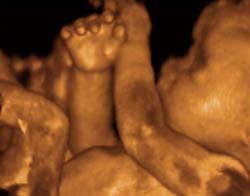A New York City-based pro-abortion law firm has filed a lawsuit challenging a new pro-life law Gov. Rick Perry signed that allows women a chance to view an ultrasound of their unborn children before an abortion.
The legislation allows women to see the ultrasound 24 hours before the abortion and abortion centers typically do ultrasounds to estimate the age of the baby before the abortion but they don’t normally allow women a chance to see or explain to them in detail the development of their unborn child. When used in pregnancy centers offering abortion alternatives, approximately 80 percent of women change their mind about having an abortion.
 Women who live 100 miles or more from am abortion center wait two hours from the ultrasound to the abortion and they are given the option to decline to view the ultrasound.
Women who live 100 miles or more from am abortion center wait two hours from the ultrasound to the abortion and they are given the option to decline to view the ultrasound.
The Center for Reproductive Rights filed a lawsuit against the provision, which takes effect on September 1 and asks U.S. District Judge Sam Sparks in Austin to block the state from enforcing the law until the lawsuit is resolved.
According to an AP report, the pro-abortion group claims the law violates the First Amendment rights of abortion practitioners by telling them to offer information to women considering an abortion that they normally don’t provide. They object to portions of the law requiring abortion practitioners to describe the ultrasound to women contemplating abortion if they choose to hear the description.
“The Center argues that the ultrasound requirements violate the First Amendment rights of both the doctor and the patient by forcing physicians to deliver politically-motivated communications to women, regardless of their wishes,” said Maxine Mitchell, a representative of CRR.
Alan Braid, an abortion practitioner, released a statement about the lawsuit, according to the Fort Worth Star-Telegram newspaper.
“My job is not to make the patient feel guilty about her choice or force information on her that she does not want; my job is to care for the patient, act in her best interests, and respect her autonomy,” Braid writes. “To provide her information that she does not want and that may cause her harm is certainly against my oath as a physician to ‘do no harm.'”
Katherine Cesinger, a spokeswoman for the governor, said Perry was happy to sign the bill into law — and he made it a legislative priority and pushed for it in the legislature.
“Governor Perry was pleased to sign this important legislation, which bolsters our efforts to protect life by ensuring Texans are fully informed when considering such an important decision,” she said.
The Senate passed the bill on second reading on a 21-10 vote and all hostile, pro-abortion amendments by Sens. Wendy Davis, Jose Rodriguez, and Leticia Van de Putte were defeated. After the Texas Senate signed off on the legislation, the state House, on a 94-41 vote, voted to concur on the Senate changes to HB 15, the sonogram bill.
During the debate, the biggest point of contention was whether women should be allowed to see the ultrasound 24 hours before the abortion so they have time to reflect on the information and images showing the development of their unborn child. Without the reflection time, legislators were concerned abortion businesses may rush women into abortions they may not otherwise want if given time for consideration.
Sen. Carlos Uresti, a San Antonio Democrat, said the 24-hour waiting time would make it hard on women who live in rural areas because they would need to make two trips to the abortion center. But Sen. Bob Deuell, a Greenville Republican, said the bill is also about protecting unborn children. Women who live more than 100 miles from the abortion center are exempted under the bill.
“It’s to give the child that one last chance at life, and perhaps prevent remorse on the part of that mother at a later date,” Deuell said.







